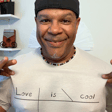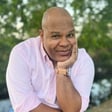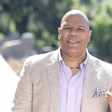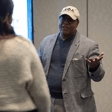Transformational Power of Greek Life
00:00:00
Speaker
corn sweat. That's what I got out of my interview with Corey Bosco. Okay, I got more than that.
Introduction to Ethocast Podcast
00:00:07
Speaker
The man believes that students involved in fraternity and sorority life have transformational power. And he believes that is not just limited to campus. He sees it going beyond campus all the time.
Eddie's Background in Ethical Leadership
00:00:19
Speaker
And so let's have that conversation with Corey on episode row of Ethocast.
00:00:27
Speaker
Welcome to Ethocast, a podcast about sound leadership practices to boost life in college fraternities and sororities. I'm Eddie Francis, presenter of Followership to Leadership and the Black Greek Success Program, presentations designed to help Greeks become more ethical. effective leaders. On Ethocast, I'll share lessons learned from my college days, my career journey, and leadership research. Ethocast is a four-hour edification limited series and presented by Edify Adventures. This is Ethocast. Leadership to the letter. Thank you for joining me on Ethocast.
Meeting Corey Bosco
00:01:03
Speaker
I'm Eddie Francis. Joining me is Corey Bosco. Corey is the director of fraternity and sorority life at Bradley University. University. He's a former conference chair with the Northeast Greek Leadership Association, and he is also a consultant with Greek University. Had the pleasure of meeting Corey at NGLA earlier this year. Corey, how are you doing, man? I'm doing great, Eddie. How are you doing? I'm doing good. How's the Midwest treating you? You know, it is beautiful, entry to fall weather out here, so I'm i'm ready for that cooler air, those red leaves just selling into winter.
00:01:35
Speaker
I tell you, man, I really, really envy that because I'm down here in New Orleans, right?
Cultural Comparisons: New Orleans vs. Midwest
00:01:40
Speaker
So first of all, first of all, I'm bracing for a hurricane, but it's going to be fine. It's not going to be a horrible one, but.
00:01:48
Speaker
I'm going to give it to you the way a guy I used to work with in morning radio, a guy named CJ Morgan, you know R.I.P. um CJ said there are two seasons in New Orleans this summer and next summer. we don't We don't get to see leaves change around here. Leaves just fall off the trees. That's it. That's just how it happens. I would say if you want to understand the experience we go through in late August, look up the phenomenon known as corn sweat.
00:02:17
Speaker
it pour well It creates a bubble humidity around here that drives that temperature up. All right. Hold on. I'm writing this down corn sweat because it just sounds entertaining as I don't know what I'm definitely going to be checking that out.
Greek Life's Influence on Campus Culture
00:02:32
Speaker
Um, Corey, one of the things I noticed about you when I first looked at your Greek university profile is that you really seem to be in this, into this concept that people who are in Greek life, college students who are involved in Greek life have real transformational power. Um, it makes sense to me. Of course it makes sense to you. Does that make sense to them though? Why is that something that you, why is that something that you like to talk about?
00:03:03
Speaker
You know, honestly, I think it is one of those things that students, when they're in the process, they don't realize how much larger it is than just themselves. um it's the when you're When you're down in the thick of it, you don't realize that one action here influences another action there, influences another action there. and Just simple things can create such a huge difference on college campuses. um You know, talking to one community that did um part of their Greek Week, they did a program of like random acts of kindness for Greek Week points.
Servant Leadership in Greek Life
00:03:37
Speaker
And just the simple act of being in letters and opening up doors for other students on campus
00:03:42
Speaker
change the perspective of that community in such a way that their recruitment numbers the next year start to increase again. um And so it's I really talk about that ability to go from such a small change to such a large transformation um on campus. Now, of course, there's lots of components to that. But, you know, sometimes it's the littlest things that really get stuff started. The views expressed on Ethocast do not necessarily reflect the views of the hosts, guests, or any entities with which this podcast's participants are affiliated. Questions, comments, email eddie at eddiefrancis.com. when you So i like I love the example of opening up the doors. Is that because
00:04:24
Speaker
You had a group of students on that campus who had the perception that they were not allowed to even mingle with people in Greek life. They saw Greek life as something that was over here and they were over there and they felt like there was a barrier in between the two ah the two parties. I would say it was more of ah a culture on campus that was more of like a fast pace, right? People are just headphones in walking and doing their thing and nobody's interacting with each other.
00:04:50
Speaker
And so just the simple actor stepping out of the way and holding the door for the next person had that person taking their headphones out or engaging and saying, thank you. And recognizing that they were in Greek letters, it tied that message of service and community into that campus. um And yeah, later it added to those, those different factors for recruitment. Talk a little bit more about that because some people may hear this and they may say,
00:05:18
Speaker
So what, they opened the doors to the campus and yeah, people took off the headphones in it, but that's not really service,
Greek Life as a Catalyst for Campus Transformation
00:05:24
Speaker
is it? I mean, talk a little bit more about how that really is not just service, but it is serving leadership from the Greeks themselves, those far reaching effects.
00:05:36
Speaker
And you you said it right there, that servant leadership component, right? It's not true community service, right? You're not really doing any service that would be defined as community service hours, but you're providing a service to your campus and you are building a community around you. um And so those servant leaders, like that role really does resonate with folks. The ability to not just say, I live to these values, but to actually live them and actually do them,
00:06:05
Speaker
Um, it resonates, you know, I, I joke with my students sometimes, you know, this generation of student coming in, they can smell, you know, fake miles away. And so whenever you say, Oh, it's nice to meet you, nice to meet you, but then you don't follow it up. You don't hold the door. You don't.
00:06:22
Speaker
you know, engage with them next time you see them on campus, it feels fake. um And so they distance. And so whenever they see um students in Greek letters holding these doors, being nice to them, giving them, you know, sweets right before finals, these things resonate to a level of care within the community that um the our college students respond to. It's it's things they wanna feel and see.
Leadership Roles in Greek Life
00:06:49
Speaker
Why is the influence So strong with Greek life. Is it, is it because if you imagine a fraternity, a sorority chapter as the nucleus, is it because they act as something like that? There are nucleus and this energy just emanates from them. is Is it, is it that kind of concept about why that transformation can happen?
00:07:12
Speaker
You know, I do like that concept, um you know, that that idea that they are one unit in their connection with with pieces. You know, honestly, it plays well when you consider that on the majority of our college campuses, most of the students who are involved in other student organizations and things like tour guides and campus leaders are also mostly Greek. yeah They are also mostly involved in our community. And so when you think about the ripples and the waves and the layers that we have in how our actions play across campus, it's not just impacting our chapter. It's not just impacting our council. It's now reaching into the activities council, the student government, the orientation leaders, the campus tours,
00:07:57
Speaker
it reaches a a large area. And so yeah, that kind of concept you talked about of a nucleus, it really is the center of that cell of that build building of momentum across the campus. Let's talk about larger
Greek Life's Societal Influence
00:08:11
Speaker
society. So um one of the conversations that came up with me and a ah friend of mine is we talked about how exciting it is to have a member of an NPHC sorority running for president of the United States. Like this is the moment for those of us in the divine, now we've been waiting for this moment for a long time. And, and I feel really, really fortunate and blessed to be able to see it in my lifetime. Um, we actually kind of sort of got close with Shirley Chisholm. Um, when she was going for the democratic nomination, we got close with Jesse Jackson when he was going for the nomination.
00:08:51
Speaker
um Barack Obama isn't Greek, not that we know of. And so now you actually have it. And part of that conversation that I was having with this person was, well, Greece have actually been there the whole time, almost the entire time. Like you've had all of these different presidents who have been in fraternities. And so when you talk about that larger impact on society as a whole,
00:09:19
Speaker
it really seems as if this this race is really starting to call a little bit more attention to that. But beside it being a title, a big title, when you look at the transformation that it causes across society, what are some of those, what does some of that transformation look like from Greek life? Even if you have somebody who said, well, I was Greek, I don't do that stuff anymore. What does that transformation look like?
00:09:46
Speaker
You know, it's an interesting thing. and You know, there's been so many studies that have been done on it. um I know the NIC has pushed a number of those studies out there that have shown, you know, by being in a fraternity or sorority organization, um you are more likely to graduate.
Enhancing Graduation and Career Success
00:10:01
Speaker
You're more likely to get a job in the field of your choice, you know, particularly the one you're studying. You're more likely to be paid higher than your non-Greek peers. um And you're more likely to show all factors of um success and satisfaction that we measure um, in one's life. And so is it because we are attracting a certain type of person that is automatically going to, you know, express those types of skills or are we a machine that is creating these skills and developing these leaders from the beginning? I lean toward the second one. I know folks will point toward the first one and say that because some of our organizations are built on the concept of privilege, you know, that there are certain folks that,
00:10:44
Speaker
afford that privilege and can get in these organizations. But when you look around and look at every campus, I don't see that as as
Corey's Rapid Rise in Greek Life
00:10:52
Speaker
the factor. I see that our organizations are opening with welcoming arms, bringing people in and saying, OK, here are some skills that we can help teach you that are going to not only help you function in our organization, but are going to advance you well beyond college.
00:11:09
Speaker
um We're talking about social skills development. We're talking those leadership development skills. We're talking the ability to, you know, strike up a conversation with a random stranger and actually have a conversation. um You know, i I'll get on my soapbox for a minute and talk about, you know, we know social media has had such an impact on the generation in college right now that, you know, sometimes you sit people down next to each other and they don't they don't know how to carry a conversation back and forth.
00:11:38
Speaker
um And so that is something that our organizations excel in, is teaching those students, here's how you can have this conversation, here's how you can build that relationship. And it's really giving students that have felt distanced and disconnected in the technological era to feel like they have a home, feel like they have a connection. um But going back to the point, it gives them those skills that allow them to succeed when they go and do their interview. and that allows them to succeed when they're in their workplace and they have to negotiate conflict between their, their team members. These are all skills that they're developing within those chapters. And just, it's, uh, I don't know how else to say other than it is so transformative to see those skills in or into the post-college world. So what about you? I mean, when we you think back to what you got out of it, first of all, what is your fraternity? I'm a member of Sigma Pi.
00:12:35
Speaker
Okay, cool. So when you think back to becoming a member of Sigma Pi, what did Corey pick up? What skills did you, did you notice, uh, you know, really helped you become, become a more of a, of the individual you want it to be? Yeah. Uh, you know, I'll, I'll be fully transparent and say I didn't join until I was a senior. Um, I spent most of my undergraduate career, um, playing ice hockey and just didn't have the time.
00:13:02
Speaker
to commit to joining that fraternal organization and so senior year I made the leap and I joined and immediately my chapter got in trouble. um We were suspended for most of my senior my fall semester my senior year. um And when I was able to finally initiate into that chapter.
00:13:21
Speaker
um I got elected chapter president that almost that same week. So it was a very quick turnaround. Oh, you have one of those stories. So do I. OK, go ahead. I was thrown right into the fire. um We restructured a lot of our bylaws. We met with the university and established leon here's how we're going to respond to the trouble we got into and recover through those sanctions. um And I feel like in the time I had with that chapter, even though it was smaller,
00:13:51
Speaker
between the the members themselves and what I was able to bring, we we transformed that experience there. um And so when I left that chapter, I got hired at HQ as a leadership consultant for the fraternity, and I worked um in the Northeast region for two years. And so I would like to say that I think, yeah, that one year, even though that was kind of small, transformed me in such a way that I was able to take those experiences and say,
00:14:19
Speaker
hey, organization, these are the things you can really get out of this experience. And I want to make sure that you're aware of that, um you know, for all the chapters that I was responsible to work with. That's pretty cool. i You know, I can say that, well, first of all, your presidency was way more productive than mine. I can tell you that much. But, um,
00:14:41
Speaker
I can say, and i and I do tell people this, that I actually found my voice in fraternity life. I was actually a pretty quiet person and I really did talk more after that because I i really started to understand who I was um a little bit. I understood it too well at times. um You know, the pendulum swung way in the other direction with me, but it did lead to some great career opportunities because I just,
00:15:10
Speaker
I was, I was just more expressive about who I was and, and when, what things meant to me and that sort of thing. And I think that's really interesting how Greek life can bring so much out of an individual.
Technology's Impact on Social Skills
00:15:23
Speaker
Um, and I will tell you this, I don't know if you heard this at NGLA, but when I spoke to a bunch of members at NGLA, they actually expressed a lot of concern that the students now, the new members coming in,
00:15:39
Speaker
have even less in the way of social skills than they did. And and some of them even said, I knew I was rough around the edges when I got in, but the people coming in now are even rougher around the edges. is Is that something that you've been hearing even if it's on campus or whether it is through ah social channels? Is that something that you've been hearing? Oh, yeah. um I think it's is a combination of factors. um One, yeah, social media and technology are becoming more and more prevalent.
00:16:08
Speaker
but the flip side of that too is we also went through COVID and the generation entering in college, I believe the freshmen this year were like freshmen eighth grade when COVID hit. And so we're starting to see the folks that were at their peak development, like during COVID are now working their way through college and the folks that are starting to enter, they were at a different point in their development that some of those skills are now starting to regain. um And so,
00:16:37
Speaker
You know, just the freshman class this semester that just came in already noticing they're more excited to be involved on campus than the last two years. And i so I think that point is real in that some of the the social skills have been seen to decline. But I can't necessarily say it's it's all technology, it's all social media, because we have a lot of national and global factors that have influenced that development as well, to say that Maybe we give it a couple more years and keep working and we're going to start to see those skills start to rebound um just because the impact of COVID in their development. Yeah, I don't know. I don't know if you've ever looked through or heard of the Edelman Trust barometer, but Edelman is at all iss a PR firm that likes to gauge the trust of the public and and what's happening.
00:17:29
Speaker
And a couple of years ago, their trust barometer showed that the real lack of trust was in leadership. I mean, whether there it's government leadership, business leadership, even in a nonprofit sector, people just had these issues. But the barometer a year later showed that people still had that distrust, but they thought that innovation would really come from the private sector more than any other place.
Demand for Authentic Leadership
00:17:51
Speaker
But the real point being that, you know, I can see today's student really being distrustful even more than before of people in authority positions. um And so I can see where that gives them pause to look at something like Greek life, or maybe even when they get into Greek life, um still having ah a bit of a distrust because now there are people in the administration who they're looking at, they're looking at their directors of fraternity, sorority life, and they're looking at all these people
00:18:26
Speaker
And to a point that you made a lot earlier about that you made earlier about students really wanting to see some authenticity from people, I really think this generation is demanding very loudly authentic leadership. um they they want the administrators to say They want the administrators to be who they really say they are, um and they want the institution to be what it really says it
Gen Z's Skepticism of Systems
00:18:53
Speaker
is. and so Are those factors that that you would say that maybe that's something that you noticed as well, that maybe that distrust, maybe what contributes to their, you know, their hesitancy is that they may have more of a distrust ah of some of the authority figures on campus and beyond? I i really do think that is a major factor. um Actually, I did a recruitment training with our IFC and Panhellenic communities just prior to New Student Move-In.
00:19:23
Speaker
and literally said just that. The they're the incoming generation of student generation or Gen Z and as we move into Generation Alpha, the big trademark says they don't like systems. and you know Some of the studies have pointed out that some of that is because they have been told or they have been experiencing that hey, our generation is going to have it worse off than the previous generation. And these systems are probably the cause of it. And so, yeah, these generations coming in are kind of hardwired to not trust any system. um And Greek life is a system. And so that authenticity to showcase that, yeah, what you perceive of this system isn't actually what's going on here. Here's what we can actually do for you.
00:20:08
Speaker
um is is pulling back the curtain and showing that transparency is is important to this generation. um I would say the other factor in this generation that is important too, and this can lend to that authenticity, but is also important is affordability. you know This is a generation that has seen the economic turmoil and is concerned about rising cost of college and lower average pay. um And so they want to know that the dollars they're spending are worth the spend, and they are going to make them back or increase what they can make back on the other end. And so when you're sitting here saying, hey, come join an organization, here's our cost and to join, that's already a ah red flag stopping point for this this generation of student. And so you have to really put at the forefront
00:20:59
Speaker
Not just that you're authentic and that here are the nice, amazing relationships you're gonna build with your brothers and sisters, but hey, here is what you're gonna get out of that dollar spend.
Encouraging Student-led Experiences
00:21:09
Speaker
Here are the things you're gonna see. You're gonna get these skills developments. You're gonna get this network of alumni. You're gonna be connected to a movement that is much larger than your college um and is gonna be even much larger than just your career when you graduate. um And so all of those things are pieces that we should be marketing.
00:21:28
Speaker
Because those are the things this generation is wanting to understand about our system, not just that a system exists. Yeah. Yeah. So I want you to, and not know you've I know you've done this many times before, you just had a leadership retreat. If you had to, if you had to sit with a group of students though, who are interested in Greek life and they are sharing all of these concerns,
00:21:58
Speaker
would you, what part of your message would be, you know, you have an opportunity to change it and what part of your message would be, you know, um, you know, we, we, we're also depending on you at the same time. He like, what, what does that messaging look like? You know, I can't say there's a one size fits all response to that point.
00:22:22
Speaker
every person is gonna approach with ah with their own story and their own connection to the subject matter. But I think for me, it's it's it's a balance between those two to say that, you know yes, you are gonna benefit with these skills and these pieces, but you do get to create what you're what you're experiencing. You are going to wield a lot of power as a social fraternity or sorority on the campus, whether it's because you're connected in other organizations or you know all the different factors.
00:22:51
Speaker
But as a student leader, being able to craft that should be an enticing piece. Being able to say that I'm walking in and I'm not just repeating traditions because we've done them every time, but that I can come in and say,
00:23:05
Speaker
Hey, I really feel passionate about this elementary school down the street. Let's do ah a partnership and do a trunk retreat with them for Halloween um and and bring some enjoyment to their experience in their community as well. um Those are pieces that our students are looking for, um at least on our campus. um And so I think between those layers,
00:23:28
Speaker
It is, yeah, we're desperate to get you in because we really need to fill houses. We need to fill the beds, but also like you have a chance here to really advance yourself um while also bonding with our members. And when we were working with our students in that and that ah recruitment training, it was pushing that message of let's focus on the benefits. Let's focus on what they're going to get out of this. And then once you're through that initial conversation,
00:23:55
Speaker
Then let's talk about like the state of our community and how they can be an an impact in that. um And I think at least for our fraternity community, which has seen growth the last couple of semesters, that message has hit home. um And so hopefully that's that's the direction we need to keep going. One last question.
Building Healthy Relationships with Institutions
00:24:14
Speaker
What does it look like for a fraternity or sorority to have a healthy relationship with the institution as a whole?
00:24:22
Speaker
It can take many forms. um Sometimes it is just as simple as every time something major comes up or something of concern that you're sending a simple email to the Greek advisor or to the administrator and just say, hey, here's here's what we're navigating. Do you have any insight? Or I just want to let you know. It can be as simple as that.
00:24:41
Speaker
It can be as complex of, hey, I want to schedule some regular meetings or, hey, I'm going to pop in your office and just say hi and check in on things. um But I think a good relationship with the Greek office isn't a one way street, right? It's not just expecting those chapters to come to my door or to reach out to me and talk to me. It's me also getting into their spaces.
00:25:01
Speaker
um going to their chapter meetings and and doing some town halls, um going into the council meetings to be able to provide a space for them to um see you as a normal adult human being interacting with them.
00:25:15
Speaker
you know you brought up earlier, seeing the administration as a system and in just they want that transparency and authenticity. And I think for us, building those relationships is taking us into those spaces to show that we are authentic, transparent leaders for this community. Awesome. Corey Bosco, he is the director of fraternity and sorority life at Bradley University. Also, he is the former conference chair of the Northeast Greek Leadership Association and a consultant with Greek University, Cory, man. Thank you so much. Appreciate it. Appreciate your time on Ethocast.
00:25:51
Speaker
Definitely. It was a pleasure being here. etocast is a for our edification limited series if you like what you heard like and follow this podcast for more leadership insights for your fraternity or sorority chapter to find out how you can bring followership to leadership or the black greek success program to your campus or a campus near you email today eddie at eddiefranncis dot com until next time spread brotherly and sisterly love wherever you go




















